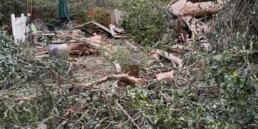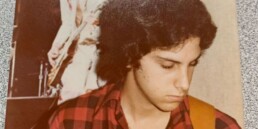Growing up in northeast LA County, I knew one set of numbers were so incendiary they were practically fighting words.
7-1-0.
It was shorthand for the polarizing battle over whether to complete the Long Beach (710) Freeway from its dead-end in the city of Alhambra northward to another freeway, in what would become the longest, fiercest fight of its kind in history. Since the 1960s, tiny South Pasadena mounted an epic defense to prevent the state from carving that 8-lane superhighway near the center of its leafy, Anywhere-USA town. Caltrans, the planet’s most formidable freeway-builder, was equally motivated to unleash its bulldozers, no matter South Pasadena’s contention it’d be its civic death sentence.
I lived that grinding draw. In fact, I was nearly killed as a teenager driving the wrong way on a one-way street that’d been configured for the project. As a young reporter for the Pasadena Star News & Los Angeles Times, I covered the searing emotions around the 4.5-mile extension, arguably among the most contested real estate anywhere outside of a war zone. Later, I was almost knifed by a squatter inside an abandoned property that Caltrans owns along the route.
Fate tapped me again as the pandemic settled over us in 2020. It was then I embarked on a journey to chronicle the story in a rollicking book. By early 2022, I’d conducted 50+ interviews, mostly via Zoom, including a pair of deathbed interviews. Soon I was entrusted with key figures’ archives, notably from South Pasadena’s original freeway fighter, an incomparable woman from Beaumont, Texas named Alva Lee Arnold. Going in, I’d thought I knew the basics. Boy was I in for an education.
It’s an uniquely American tale asking whether a people’s right to self-determination surpasses the broader public need, in this case filling in a “missing link” ribbon of concrete through dense neighborhoods, in 3 different cities, for the sake of an overtaxed, smog-pumping freeway grid. It spotlights a different brand of feminism in Alva Lee’s grassroots resistance, and how much of our souls we sacrifice to the car culture. It uncovers old feuds, political betrayals and cowardice, and freeways as “Jim Crow of the West.” How a village of 25,000 triumphed against astronomical odds, beating not just Caltrans, but also surrounding cities, real estate men, deep-pocketed trade unions and others, is David vs. Goliath that Goliath can barely believe. The 710’s environmental-justice arc staggers too, beginning in the teeth of the deadly smog crisis and culminating at our climate-change reckoning.
For all the major events influencing the outcome— bellwether laws, elections, 9-11, Hail Mary injunctions, global commerce, the rise of minority power—this is the story of the People of the 710, and you won’t believe how personal twist and turns affected the trajectory. That I promise. I’m honored to be writing this book and thank everyone for their unstinting patience and belief. I’ll keep you updated.
Related Posts
The Tree and the Voice and Writing a Novel
"Later Days" began when a brilliant, dying friend asked me…
From the Department of Unexpected: “Later Days” Wins General Fiction Prize at the American Writing Awards!
And, in another humbling development, it was also named…
“The Lost Art of Album Release Parties” – Boomer magazine
We hustled into my room, nodding at the familiar, Jimmy…




